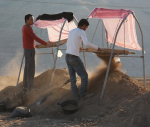You are here
‘Jordan needs to take development process to new level of genuine engagement’
By Camille Dupire - Jan 23,2018 - Last updated at Jan 23,2018

Sara Ferrer Olivella
AMMAN — Jordan is standing at a “crucial shifting point” where it needs to transition from an emergency humanitarian response towards longer term development, according to a top UN official.
“Jordan is at a very strategic stage nowadays as it resumes its path of sustainable development that was put on hold to respond to the recent humanitarian crises,” UNDP Country Director Sara Ferrer Olivella said in an interview with The Jordan Times at the UNDP headquarters in Amman.
“Since we opened our offices 41 years ago, we have been accompanying Jordan in its development journey, and we have been firsthand partners and witnesses to the wide ranging consequences of the regional crises and the influx of refugees on the country’s capacities,” she explained, noting that “a spectrum of actors has entered the humanitarian scene over the past eight years, focusing exclusively on the emergency response”.
“It is now time to support Jordan in refocusing on the development axis, by helping stakeholders implement the various reform processes that were paused during the last decade,” the UN official said, highlighting decentralisation and social participation as “top priority areas”.
Since the formulation of the Sustainable Development Goals (SDGs) in 2015, Jordan has demonstrated a “remarkable engagement” in grounding the 2030 Agenda to local needs and capabilities, Olivella said, commending the work of institutional actors in “including the global development vision in its national framework”.
“Now that the government has a roadmap for SDG implementation, the government has to undertake the equally complicated task of prioritising those goals, and proving its commitment to implement them so as to create real improvements in citizens’ daily lives,” she stressed.
In August 2017, the Kingdom moved towards a more localised governance through local elections and governorate elected councils.
“Decentralisation has been one of the most pivotal steps for Jordan to go forward,” Olivella noted, stressing the need to “focus on the role and responsibilities of the elected councils.”
“For decentralisation to succeed, the Jordanian people can become the active leaders of the change themselves. Leadership no longer exists solely at the top national level, and each individual is empowered to exercise his or her own capacities,” the UN director explained, noting that Jordan is progressively shifting from a solely vertical decision making to embracing a more horizontal way of developing capacities.
“No decision can ever be successful if it is imposed by an authority figure exercising leadership with no participative vision,” she underscored, noting that the municipalities and councils where the changes were the most effective are “those who work with their communities in implementing a vision that they all share or at least discuss”.
Citing the example of solid waste management, she recalled how a community resisted the establishment of a garbage station “because they had never been part of the planning decision, and were therefore not empowered to understand how the change was going to be beneficial for all”.
The work of the UNDP, she said, is to bring together all actors in sharing expertise and understanding the timing and consequences of change.
“Development cannot happen without a rebalancing of capacities. One cannot simply create reformed institutions and expect the society to reform itself,” Olivella insisted, noting that “leadership is expressed at many different levels, not only the top governmental one”.
“Jordan has institutions and officials, but we now need wider inclusive participation to see development being achieved,” she concluded.
Related Articles
AMMAN — The Ministry of Interior, the European Union Delegation in Jordan, and the United Nations Development Programme (UNDP), in collabora
AMMAN — The United Nations Development Programme (UNDP)-Jordan on Sunday held a talk titled “When Women Lead, Change Happens” to mark Intern
AMMAN — UNDP Jordan Office on Wednesday announced the appointment of Sara Ferrer Olivella as the new country director.The newly appointed Sp

Opinion
Oct 04, 2024
Oct 01, 2024
- Popular
- Rated
- Commented
Oct 04, 2024
Newsletter
Get top stories and blog posts emailed to you each day.














